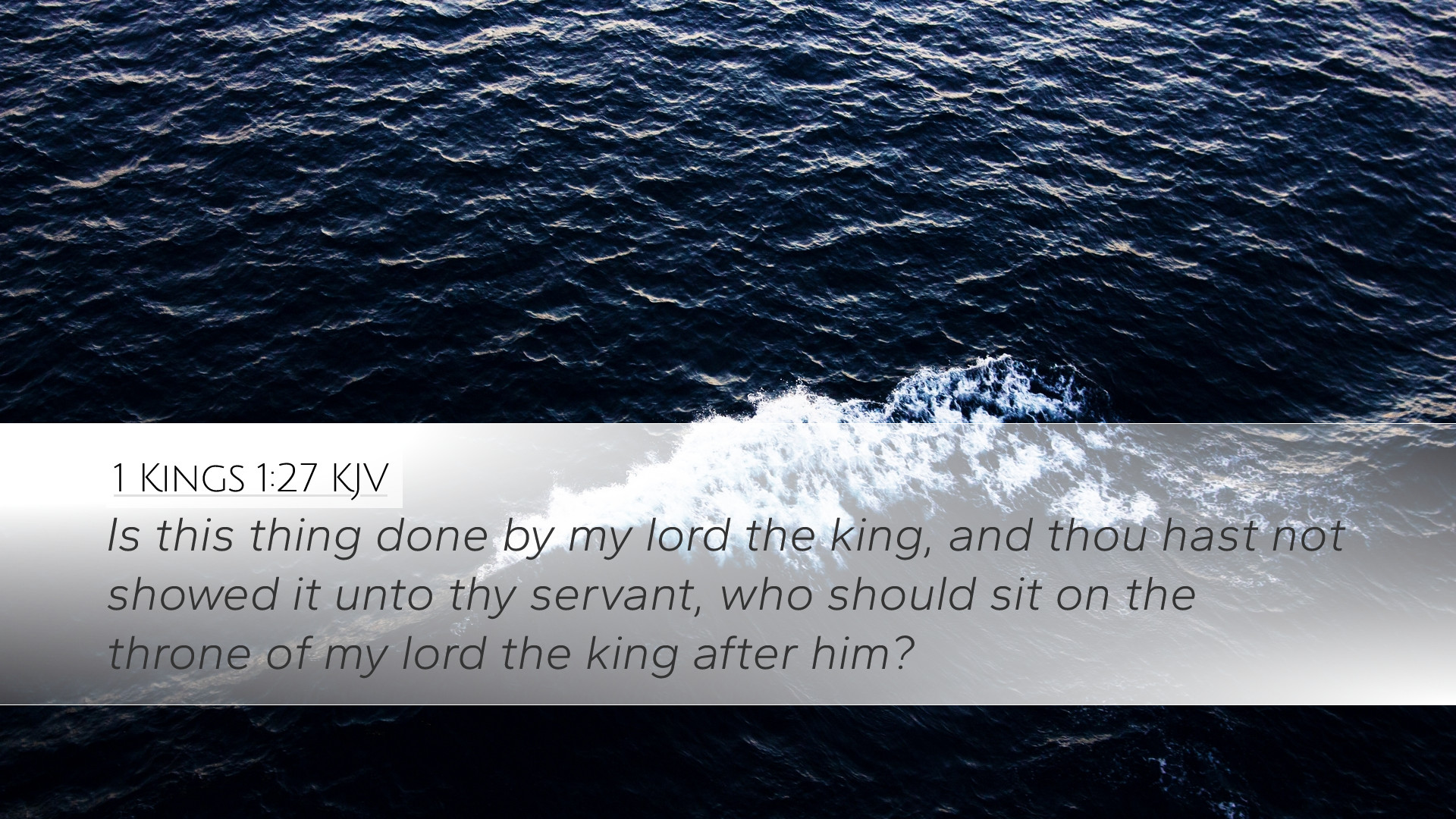Commentary on 1 Kings 1:27
Verse: "Is this thing done by my lord the king, and thou hast not shown it unto thy servant, who should sit on the throne of my lord the king after him?"
Introduction
The passage in 1 Kings 1:27 occurs during a tumultuous period in Israel's history when the succession of the throne was under significant debate following the death of King David. This verse expresses concern regarding the rightful successor to the throne amidst competing claims. Understanding this verse requires delving into the broader contextual, theological, and political implications. It speaks profoundly to the question of God's sovereignty, the nature of divine ordination, and the human injustices that arise in leadership transitions.
Contextual Analysis
This verse is nestled within the narrative of King David's old age and the rise of his son Solomon. Previous chapters outline the predicament that leads to Adonijah's self-proclamation as king, which sets the stage for the power struggle. The question posed here implies that neglecting to inform the rightful heir about succession implies a disregard for God’s appointed order.
Commentary Insights
Matthew Henry's Commentary
Matthew Henry emphasizes the importance of rightful succession and how the failure to reveal God's plan causes confusion and disarray. He suggests that David's silence on the matter was a significant oversight when a clear directive concerning Solomon was needed. Furthermore, Henry alludes to how neglecting divine wisdom in leadership transitions can lead to chaos within the community.
Albert Barnes' Commentary
Albert Barnes focuses on the implications of this moment in terms of prophetic fulfillment. He indicates that the prophecy concerning Solomon's rise must be made known to all involved in the leadership structure. Barnes highlights the tension created when personal ambitions overshadow divine will, leading to factions and competing claims for authority. He underscores that the question posed in verse 27 reveals a deeper conflict — one where human understanding clashes with God’s sovereignty.
Adam Clarke's Commentary
Adam Clarke takes a historical-critical approach, noting the political dynamics at play. Clarke draws attention to the importance of communication in governance and how this oversight signifies a broader issue of leadership failure. He also remarks on the character of the inquiry—an indication of betrayal and uncertainty—and how it reflects the volatility of kingship during this period in Israel's history.
Theological Themes
- Sovereignty of God: The foundational belief that God is in control and orchestrates the events of history, including leadership succession.
- Human Responsibility: This verse elucidates the role of humans in acknowledging and submitting to divine authority, emphasizing the need for transparency and righteousness in leadership.
- The Nature of Leadership: The ongoing struggle for power depicted in this verse highlights the essential qualities of godly leadership—wisdom, humility, and faithfulness to God's directives.
Practical Applications
This verse can provide profound insights for modern leaders, theologians, and church members. Here are some practical applications:
- Seeking Divine Guidance: Leaders should consistently seek God’s wisdom when making decisions about leadership roles within the church or community.
- Encouraging Transparency: Open communication regarding leadership transitions can help mitigate conflicts and foster unity.
- Recognizing God's Plan: Understanding and sharing God's plan for leadership enhances trust and faith within the community.
Conclusion
1 Kings 1:27 serves not only as a historical snapshot but also as a timely reminder of the complexities surrounding leadership and succession. It draws attention to the need for divine counsel, the importance of transparent communication, and the acknowledgment that God ultimately directs the affairs of humanity. As we ponder this verse, let us strive to align our leadership practices with God’s will, ensuring that our actions reflect a commitment to His sovereignty.


